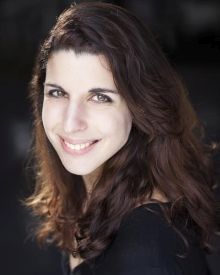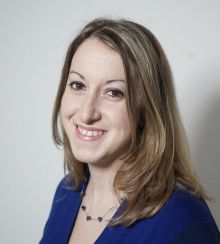‘Getting pregnant was the best career move’
AT THE London Freelance Branch meeting on Monday 13 March we heard two speakers on their experiences as freelancing as women and as mothers. This was our modest way of marking Women's History Month - and International Women's Day, which was on the previous Wednesday, 8 March.

Abla Kandalaft
Abla Kandalaft is a journalist and film programmer. She was co-producer of Alternative Cinema on BBC Arabic for four years. She currently works at the Garden Cinema. She sits on the board of the Independent Media Association. We invited her to discuss the precarious nature of freelance status and the impact it has on things like maternity leave - and opportunities for career progression and pay.
Abla told us that she joined the NUJ as a temporary member when she was getting started, in Paris 12 years ago. "I want to highlight a contract I had from the BBC," she told us - "a PAYE freelance contract". This very special status is not widely known outside such institutions as the Beeb. It means that you have none of the rights of an employee, but have tax and National Insurance deducted from your earnings under the government's Pay As You Earn (PAYE) scheme.
"I worked under that contract for five years. I did push to have a 'proper contract' all that time" - without success. The effect of being a PAYE freelance is that "they set the rate they pay you... you do get holiday pay, but can't negotiate anything else. It's basically a 'zero-hours' contract." Someone on a PAYE freelance contract is not guaranteed any work.
And when Abla was pregnant she got only statutory maternity pay - nothing under her contract with the BBC.
"I had my first daughter over the summer when the programme was quiet" -it was running a lot of repeats.
When she had her second it ended up in dispute, involving ACAS, the Advisory, Conciliation and Arbitration Service. Abla eventually got compensation
When she went on maternity leave that time, she was aware that the show - "which was excellent" - was coming to an end. "Because I had been working regularly for two days a week for five years," she told us, "I was led to believe that I would be working on a very similar show."
She told management that she "hoped not to take more than eight weeks. I was already pitching segments for the new programme. I had guests lined up..."
But when she emailed in early March to check in, she got the response "your show's been cancelled and do send a CV" for further freelance work. She responded to explain - and didn't hear anything back.
"None of it would have happened that way had I not had a PAYE freelance contract. Those let freelances down, because we can't negotiate rates or set own schedule." Freelances on such contracts are at management's beck and call when it comes to when they work. "It's a very dodgy status. Ex-colleagues have had similarly poor experiences."
Abla added that "I was on the same day rate for five years. I could not negotiate. I even got an email about a general increase in staff salaries," because her job was classified as "staff" by parts of the bureaucracy" - "but I got nothing".
Work-work balance
Considering freelancing in general, Abla notes that "the trickiest thing is balancing the amount of work you have and spreading it across the year. This month I have a lot of work, and I don't want to turn it down but I have to cobble together childcare to get it done - and next month may not be the same..."
The rest of what I do I've not had too much of a negative experience with - "I've been working across sectors" and juggling them.
The Independent Media Association (IMA), meanwhile, "is trying to support better working conditions across the board - noting that women tend to suffer most from precarity". There have been some discussions about making the IMA work "as a sort of co-op for journalists... A few members are involved in drafting legislation. The Hacked Off group is a member and vocal and submitting legislation to Parliament."

Donna Ferguson
Donna Ferguson is an award-winning freelance journalist who writes regularly for the Guardian and Observer and who gives sell-out masterclasses for Women in Journalism.
Donna told us that she went freelance about ten years ago, after having a baby. "I really sympathise with what Abla is saying. I was the editor of a website and often the last person to leave the office at night. Then I got pregnant."
During her maternity leave, "I became 'Flora's mum'. No-one called my by my real name any more. I had really low self-esteem." But then she ran into the editor of the Guardian money section - "who I had met before at various journalism events" - at a mother-and-baby music group in a café in Finsbury Park. "I told her I was going freelance. I didn't dare say "can I pitch to you? - though it was obviously my dream to write for the Guardian. We just talked about our babies."
Then "A few days later she emailed to suggest that I pitch to her!"
Her first article as a freelance was for this editor, and it was on childcare costs. "I did feel I'd joined a working mothers' club. I later discovered a lot of the editors of the Personal Finance sections at the nationals were women. They were all really understanding."
Donna started pitching and was "commissioned to write three articles for the Guardian over the course of six months. I worked really hard on those pieces, because this was my chance to use my brain for the first time in a year - after just changing nappies and singing nursery rhymes." She used her husband's childcare vouchers to pay for childcare, because at the time self-employed workers did not get any. "I thought if I could earn enough to pay for childcare and a cleaner I would at least break even... my aim was literally not to detract from the household finances."
A good editor is a thing of beauty
In response to one pitch, her editor said "this is good, but it could be better. Can you check..." One pitch was sent back twice - and ended up as a major investigative piece on the front page of the section.
Six months after she started freelancing, Donna submitted the three articles she had written for the Guardian for a "Freelance journalist of the year" award - "you had to submit three to be shortlisted" - and she won it. "That opened doors at every other paper."
She has since gone on to win eight more awards for her work as a freelance journalist.
In conclusion: "getting pregnant was the best career move I ever made. I'd never have had the courage to strike out freelance before. I was resigned to working in basically a managerial role with no writing." It was still frightening - but "the more scared you are of pitching, the more you need to go for it."
Questions
Branch member Mariam asked about childcare vouchers. Donna reported that now you can get tax-free childcare as a freelance - you buy them and get a tax break. The Freelance promised to look into the rules and write them up. In the meantime see advice at www.moneysavingexpert.com.
Donna noted that "you can spend a lot more time with your child as a freelance than if you're employed. My daughter has learned she should be quiet when I'm playing with her and suddenly have to stop to take a call from an editor - although she does complain afterwards."
Abla reported: "I spent 18 months looking for flexile childcare and found none. Eventually I decided I had to go with booking childcare on set days each week."
Francesca asked: how do you get your brain free to think about something other than child-related topics? Donna suggested: "look at it as a strength. My first freelance article was about childcare costs for the Guardian's Money section. I also wrote for the Family section of the Guardian - having a daughter made me an avid reader of that section. Later, I pitched articles about children's books for the Books section - I noticed that the majority of the characters in my daughters' books were male - perhaps especially the non-human characters, for example, everyone in The Gruffalo is male. The Guardian commissioned me to do a big piece of research actually counting the characters, called: Must monsters always be male? Huge gender bias revealed in children's books.
But "if you really really don't want to write about children, think about other things that you enjoy doing when you do have a bit of spare time - running, perhaps..."
Julio recounted that his partner wanted to go part-time and the publisher refused and had to go completely freelance.
Abla reported: "I am the only person at the cinema who has children - except my sort-of manager. In the office they're mid-30s to early 40s and I'm the only one with children. All have negotiated a contract - and I'm still on a day rate."
A member asked about dealing with rejection. Donna said "I emailed one editor six or more times, and often she didn't even reply. At last I pitched something she must have liked, because she replied 'you need to pitch to my deputy.' All that time I hadn't known. I did, and he started to give feedback on what I was doing wrong with my pitches. Eventually, after half a dozen tries, I sent something that as afar as I was concerned I'd pitched to him twice before. Perhaps I hadn't phrased it in a way that got through to him. This time he took it."
Later she tried another section editor at the Guardian. "I didn't know her at all - but I followed her on Twitter." Donna sent pitches for articles, "but she didn't like them. Then I retweeted something that she'd tweeted about - and she asked me to write about it. Definitely do follow them on Twitter, and stroke their egos."
![[Freelance]](../gif/fl3H.png)